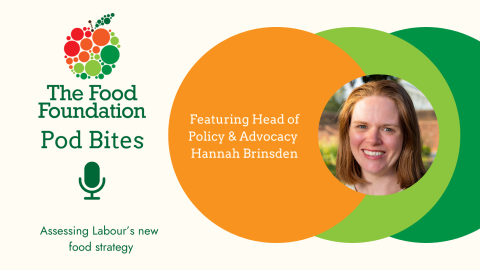08 October 2025
Is the government doing enough on food?

What progress has the Government made towards Nourishing the Nation? Food Foundation Executive Director Anna Taylor and Head of Policy and Advocacy Hannah Brinsden examine the evidence
In the run up to the 2024 general election we published our manifesto of actions which we wanted the political parties to commit to. Just over a year on from the election and as the party conferences conclude we’re taking stock of how much progress this Labour government has made against our policy asks, and the executive summary is pretty positive!
1. Make healthy and sustainable food affordable
Policy progress:
✔︎ Consultation on improvements to the Soft Drinks Industry Levy (SDIL), looking to strengthen the design (sugar thresholds, inclusion criteria and tax level).
✔︎ Increase in wages in April 2025, and increase to the standard Universal Credit allowance from April 2026 announced. However, the cost of a healthy diet was not taken into account and health benefits have been threatened, leaving many families uncertain and struggling.
The cost and affordability of food remains a major challenge for the government. Our data shows that 14% of households are still living with food insecurity; many more are cutting back on fruit and veg because they are worried about money.
Moreover, food inflation is still running high (currently at 5.1%) and we’re seeing a growing number of examples of specific foods being hit by climateflation – when prices go up because the supply of that food has been hit by a climate shock.
We’ve seen in the last few months a number of reports of focus group discussions with citizens, particularly those who voted Labour at the last election but who are tempted by Reform at the next, who are consistently raising the cost of food as a priority for policy makers.
We expect the cost of food to be a growing area of interest to the Government, and, fortunately, we think there are policy solutions. The challenge is how to help with both rebalancing of prices so that nutritious foods are more affordable than unhealthy foods while also ensuring those on a low income have more money to spend on food.
An expansion of the sugary drinks tax to other food categories (not just improving the thresholds and definitions of SDIL, which is what we have seen announced and consulted on) could meet both challenges – by driving reformulation of unhealthy foods, making them healthier and simultaneously increasing the price of un-reformulated foods; and generate revenue through a tax on food industry selling unhealthy foods which can then targeted to help families on a low income to afford nutritious foods.
2. Stop the junk food cycle
Policy progress:
✔︎ Introduced restrictions on volume promotions (e.g. “BOGOFs”) on unhealthy foods introduced from 1st October 2025
✔︎ Reaffirmed commitment to restricting junk food advertising before 9pm and online, albeit further delayed until January 2026
✔︎ New Planning guidance, preventing the opening of takeaways near to schools
Overall, we have seen some progress on advertising (and promotions), as well as on energy drinks, but this is an area where we continue to see the damaging effects of delays and lobbying. Don’t forget the advertising policy was originally announced five years ago and was due to come into force in 2022.
And while the delayed volume promotions on unhealthy foods finally came in this month, the advertising restrictions have been further delayed until January 2026.
It’s becoming increasingly clear that companies plan to work around the new regulations by shifting their advertising to brand rather than product advertising, which is currently not covered, and the delays have ensured this.
This is the classic squeezing of the balloon – squeeze in one spot, and the problem appears in a different form somewhere else. Policymakers always need to be one step ahead of evolving business practices, not dragging their feet.
3. Invest in children’s diets
Policy Successes:
✔︎ Free School Meals for all children from families receiving universal credit from September 2026
✔︎ 10% uplift in value of Healthy Start and consultation on permanent extension to all with no recourse to public funds
The expansion of Free School Meals marks major progress and we believe, combined with the improvement of the school food standards (see below), marks a once in a generation opportunity to transform school food so that it delivers maximum impact on children’s wellbeing as well as on local economies through better procurement.
Meanwhile, recognising that the current value is too low, Healthy Start payments will increase in value by 10% from April 2026. Whilst a positive development, the uplift still does not match inflation or increase eligibility meaning the full potential of Healthy Start, which gives young families on very low-incomes access to healthy food and could increase spending in the wider economy, is still not being met.
4. Make it easier to eat sustainably
Policy successes:
✔︎ School food standards review
The announcement that school food standards in England are being updated was very welcome, opening up opportunities to improve children’s diets and the sustainability of school food, through win-wins like more beans on menus. The school food standards update is being jointly led by DHSC and DFE, which shows how departments are increasingly working together on food policy – another exciting development.
We also hope that steps to make it easier to eat sustainably is where DEFRA's new Food Strategy will really come into its own in the coming months.
While no concrete commitments have been made, DEFRA is exceptionally well positioned to use its policy levers to drive a 'Good food cycle' through a combination of agriculture policy (supporting more British horticulture), public procurement (serving more British fruit and veg in public settings), R&D investment, investment in marketing of healthy foods (we proved with the Eat them to Defeat Them campaign that it works) and nutritional safety nets – using Healthy Start, social prescribing, the school fruit and veg scheme to increase demand.
It’s an exciting agenda for policy with some interesting precedent in other countries (not least Denmark’s wholegrain initiative).
5. Unleash the full potential of the food system
Policy successes:
✔︎ Announcement of a food strategy
✔︎ Mandatory reporting by all large businesses
The announcement of mandatory reporting on sales of healthy food, alongside targets, as part of a new ‘healthier food standard’ was a key component of the food and prevention commitments within the NHS 10-year plan.
This picks up on a lot of work that had previously been done as part of the Food Data Transparency Partnership, on a voluntary basis, and is an area we know many businesses, investors and civil society all align their support.
Alongside the food strategy, there have been rumours from DEFRA of a White Paper – usually used as a precursor to legislation. This is the tool which the government could use to set the long-term path for change in the food system which will survive beyond electoral cycles.
This would be good for citizens, through potentially greater food security and resilience to food price shocks, but also good for growth and business community. A Food Bill offers a clearer guide to the future regulatory agenda, offering greater certainty in new economic opportunities and business ventures, and to shore up investor confidence.
Our verdict
From a food strategy, to a child poverty strategy, to a 10-year plan for the NHS, and a list of policy commitments, promising momentum is clearly building on food policy. But we have a big systems problem which we’re trying to solve, and too many continue to face a daily struggle of putting healthy food on the table.
If the commitments of the Government’s first year are going to gain momentum and translate into meaningful improvements in people’s lives, political leadership is a prerequisite. Let’s hope in a year’s time, the Prime Minister is championing action on food – then we’ll really be getting somewhere.

Hannah joined the Food Foundation in May 2023 as the Head of Policy & Advocacy. She oversees our portfolio of policy and Government engagement activities. Prior to joining us, Hannah worked at the World Obesity Federation for over 10 years where she worked across a range of issues including childhood obesity, food systems and healthcare. She also previously worked at Consensus Action on Salt and Health as a Nutritionist, leading on product surveys. Hannah has an undergraduate degree in Nutrition and Food Science from The University of Reading and a PhD in Food Policy from City, University of London which explored the role of NGO advocacy in UK nutrition policy.

Anna joined The Food Foundation as its first Executive Director at the beginning of June 2015 after five years at the Department for International Development. At DFID Anna led the policy team on nutrition and supported the delivery of the UK’s global commitments to tackle undernutrition. Before joining DFID Anna worked for a number of international organisations including Save the Children and UNICEF and has been at the forefront of international leadership on nutrition for several years, supporting programmes in a wide range of contexts in Africa and South Asia. Anna has also worked for the UK Department of Health. In 2014 she was awarded an OBE for her work to address the global burden of undernutrition. She did a MSc in Human Nutrition at the London School of Hygiene and Tropical Medicine in 1994. In May 2017 Anna became a member of the London Food Board to advise the Mayor of London and the GLA on the food matters that affect Londoners. She is a Board member for Veg Power and an advisor to the International Food Policy Research Institute. She served as Chief Independent Adviser to Henry Dimbleby for the development of the National Food Strategy published in 2021.




